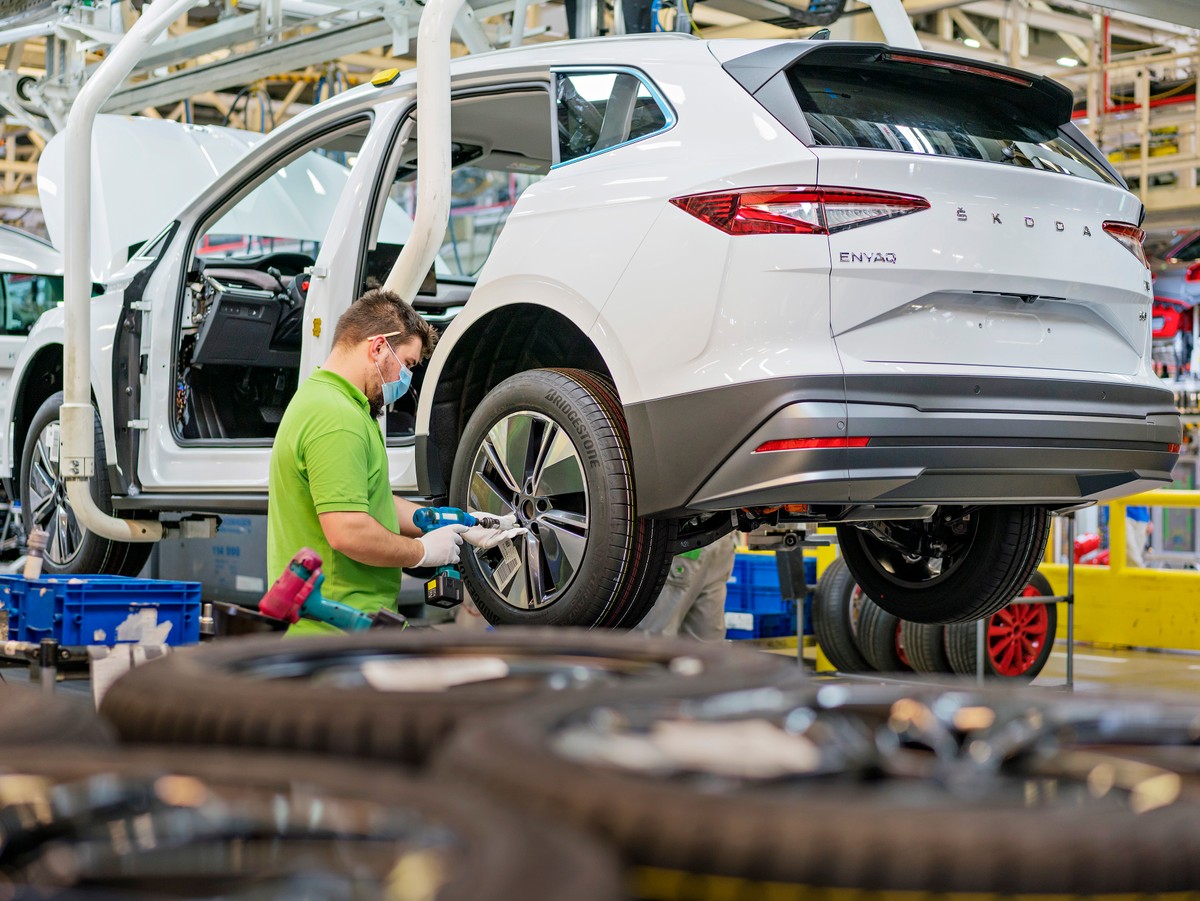Disputes in the parent Volkswagen, a hard transition to electromobility, uncompromising emission standards and ongoing production downtime due to a lack of chips. Because of this, Škoda employees are experiencing uncertain times. According to trade unionists, up to 10,000 jobs are at risk. “We can say with certainty that we are in crisis,” the Škoda trade unionist reports in the weekly.
According to trade unions, Škoda has no certain future. According to them, a drastic transition to electromobility, a planned tightening of emission standards and an unclear strategy of the parent group Volkswagen may endanger the Czech brand after 2026. “Especially by 2031, there is a risk of a decrease in occupancy and employment. If the EU7” hard “standard is adopted, the risk of losing up to 10,000 jobs increases,” said Jaroslav Povšík, chairman of the works council. Škoda trade unionist.
He discussed the future at a three-day meeting of the European and World Council of Volkswagen employees, which took place in the form of online interviews, which, according to him, impoverished important negotiations on direct interviews and recorded only fogging and avoiding direct answers. He has reportedly received only learned, meaningless answers and phrases since the management of the concern.
Upset Volkswagen
“But what else can be expected when the war in Volkswagen rages on all sides and between all: owners, stockholders, political groups, IG Metall, politicians from Lower Saxony, unions versus Herbert Diess and management. Unfortunately, they all hide behind employees. and the well-being of the company, which, however, is reducing shares, credit with customers and confidence in general. I have never experienced such a tumultuous Volkswagen, and we have been cooperating for more than 31 years, ”says the experienced union leader Povšík.
Mladá Boleslav Škoda again without a boss! Schäfer leaves to drive Volkswagen
–
–
The trade unions warn me that, as part of the Group’s strategy changes, Škoda has already lost the successor to the Superb model in Kvasiny and, according to current plans, is also losing production of some battery models. “KOVO unions support electromobility, but to ensure profitability and utilization in the future, we need Škoda models that will be manufactured in Czech plants,” they warn.
In Škoda, some shifts continue to be canceled and production shutdowns continue due to a shortage of parts, during which employees receive 80% of the average wage. According to unions, the situation regarding the distribution of scarce semiconductors to individual brands is unclear, as is the future distribution of electrified drives. According to them, the situation in the Czech Republic would benefit from a faster decision on the possible construction of a battery-powered Gigafactory.
End of the TSI engine
And the tightening of European emission standards also threatens the future production of engines and gearboxes in Czech plants. If the EU enforces the EU7 emission standard, Škoda will lose the production of the cheap 1.0 TSI petrol engine.

Will the Czechia lose its gigafactory on batteries? Volkswagen temporarily engaged reverse
–
–
“As the number of electric cars grows, so will the share of conventional vehicles that fall, experts say that up to 70 percent of electric cars will be produced by 2030. All the less will be the need for internal combustion engines and conventional gearboxes. The advantage is that “As far as the EU7 standard is concerned, yes, production of the 1.0 TSI engine is likely to end in a few years,” said Michael Oeljeklaus, a member of its board of directors for production and logistics, when asked by the carmaker’s employees.
Challenging times await us
However, together with trade unions, he allegedly negotiated with the Czech Republic for the production of a 1.5 TSI engine for the Czechia. “I can already say that we have been hit by this engine. So our goal is to switch to these units, which is technically feasible and will not be dramatically expensive. meeting of the top management of Škoda Auto with employee representatives. “We fought hard for the motor plant in Mladá Boleslav and also for the workload of the Vrchlabí plant. It is Vrchlabí that we still have to solve,” Povšík added.

Why electromobility (so far) has no chance in our country: We save 6 years on a used Škoda car
–
–
“It is a pity that in the long run, plug-in hybrids will not be produced, but full electric cars. We have to look at how many jobs we will have, what the technology will be like, how Industry 4.0 and other related topics will show. From this “In times of crisis and with regard to the covid-19 and the semiconductor situation, we can say with confidence that we are in crisis, we need to look for a constructive joint dialogue between the unions and the company,” the trade unions added.
box, TN.cz
– .

